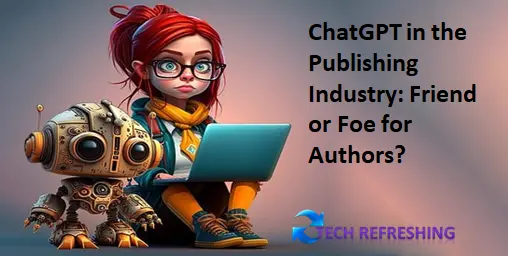
With the progress of technology, writers have access to an increasing array of tools. Among these cutting-edge writing tools is ChatGPT, an AI-based chatbot that provides writers with various types of assistance. Leveraging natural language processing and machine learning algorithms, ChatGPT can generate text, assess content and propose ways to enhance the writing process. Nonetheless, as the utilization of ChatGPT becomes more widespread in the publishing sector, questions have been raised about how it might influence the role of authors and the publishing workflow overall.
The world of publishing is a broad and constantly evolving terrain that encompasses a multitude of individuals, such as authors, editors, publishers, agents and other experts. It is a complicated industry that necessitates a significant amount of time and energy to navigate effectively.
Although the sector has undergone numerous transformations throughout the years, including the rise of digital publishing and e-books, the introduction of ChatGPT may signify a novel paradigm shift. The key issue at present is whether ChatGPT is a beneficial or detrimental force for authors in the publishing industry.
While ChatGPT can provide authors with a number of advantages, including quicker content creation, greater accessibility and more effective editing, there are also some possible disadvantages. Traditional publishing models may be threatened by ChatGPT and there are serious issues that need to be addressed with quality control and the possibility of plagiarism.
The relationship between ChatGPT and authors is complicated since ChatGPT can be viewed as a supplement to writers’ creativity or as a substitute for it. Concerns about content ownership and the place of human authors in the publishing process are brought up by the use of ChatGPT.
How ChatGPT Works in the Publishing Industry?
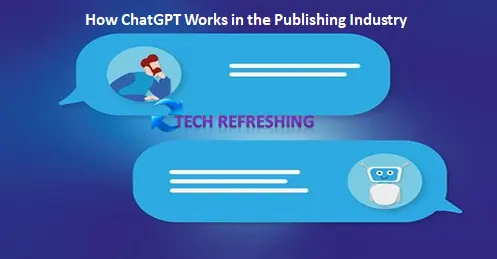
ChatGPT is an innovative technology that can be used in many ways to assist authors in the publishing industry. Here are a few ways that ChatGPT can be used:
ChatGPT as a Writing Assistant:
ChatGPT’s capacity to support authors in the writing process is one of its most beneficial attributes. Through an evaluation of the author’s writing style and the text’s context, ChatGPT can propose concepts, offer grammar and punctuation assistance, and provide constructive suggestions for enhancing writing quality.
Additionally, ChatGPT can assist authors in surmounting writer’s block by creating new ideas or providing prompts to initiate the writing process. The AI technology is equipped to analyze prior writing and content to provide recommendations for improved writing styles.
ChatGPT as a Content Generator:
ChatGPT has the potential to serve as a content generator within the publishing industry. Using natural language processing, ChatGPT can generate text that closely resembles human writing. This technology may prove useful for producing content for newsletters, product descriptions, and social media posts. Nevertheless, the output from ChatGPT still has room for improvement and it still requires editing to ensure it meets the necessary quality standards.
ChatGPT as a Book Reviewer:
As an AI-powered tool, ChatGPT can operate as a book reviewer by assessing books and providing input on style, content and structure. Additionally, the technology is capable of scrutinizing writing quality and proposing improvements. The efficient and swift book review process offered by ChatGPT can be especially valuable to publishing houses and reviewers that handle significant volumes of books and text.
ChatGPT can serve as a writing assistant, content generator and book reviewer in the publishing industry. Thanks to its natural language processing and machine learning algorithms, ChatGPT represents a valuable asset for authors seeking to enhance their writing skills or for publishing houses looking to expand their content production. Nevertheless, the utilization of ChatGPT is not entirely without risks or drawbacks, which must be assessed before it is deployed.
The employment of ChatGPT in the publishing sector is generally a hotly contested issue. Despite the numerous advantages, it is important to take into account any possible risks as well as moral issues. It will be interesting to see how ChatGPT and other AI technologies continue to affect authors’ roles and the publishing industry as a whole as it continues to change.
The Advantages of ChatGPT in the Publishing Industry
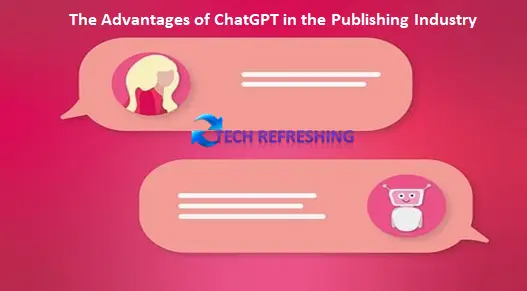
The use of ChatGPT in the publishing industry offers several advantages that can benefit both authors and publishers. Here are some of the most significant advantages:
Faster content production and publication:
Using ChatGPT’s content generation capabilities, writers and publishers may create excellent copy much more quickly. Publishing houses can produce more content faster with ChatGPT since it can create it in a fraction of the time it would take a human writer to do it. This is especially helpful for social media posts, blogs and websites that need frequent updates.
Increased accessibility and diversity of content:
By producing text in several languages and for distinct audiences, ChatGPT can also aid in enhancing accessibility and diversity of content. This enables writers and publishers to reach a larger audience and serve a wider variety of readers. Language barriers can be removed with the aid of ChatGPT’s text translation services.
More efficient editing and proofreading:
ChatGPT can also be used to edit and proofread texts much faster and more efficiently than humans can. With its natural language processing and machine learning algorithms, ChatGPT can quickly identify grammatical errors, spelling mistakes and other errors. This can save editors and proofreaders a lot of time, allowing them to focus on more complex aspects of editing and proofreading.
The potential to reach wider audiences:
ChatGPT can aid authors and publishers in reaching a broader readership by optimizing the generated content for search engines, making it easier for readers to discover. Additionally, ChatGPT can propose relevant keywords and tags to boost the visibility of the content for readers searching for particular topics. By doing so, ChatGPT can assist authors and publishers in increasing their readership and attracting new fans.
In summary, the use of ChatGPT in the publishing industry offers several advantages, including faster content production, increased accessibility and diversity of content, more efficient editing and proofreading and the potential to reach wider audiences. These advantages can benefit both authors and publishers and can help them succeed in an increasingly competitive industry.
The Disadvantages of ChatGPT in the Publishing Industry
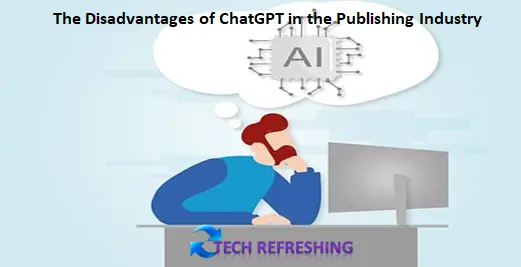
While there are several advantages to using ChatGPT in the publishing industry, there are also several disadvantages that should be considered. Here are some of the most significant disadvantages:
Threat to traditional publishing models:
Incorporating ChatGPT into the publishing industry may jeopardize conventional publishing models. As ChatGPT can promptly and efficiently produce premium content, it may jeopardize the requirement for human writers and editors. This shift can ultimately diminish the necessity for traditional publishing services, potentially influencing the overall composition of the industry.
Potential job losses for editors and proofreaders:
The effective text editing and proofreading capabilities of ChatGPT may also result in job losses for editors and proofreaders. There might be less need for human editors and proofreaders if the AI-powered bot handles the majority of the editing and proofreading chores. For those who hold these positions, this may result in the loss of their jobs and financial hardship.
Quality control concerns:
Another drawback of incorporating ChatGPT into the publishing industry is the potential risk of inadequate quality control. Although the tool can generate high-quality content, it may not always produce content that meets the required standards. There could be situations where the produced content fails to convey the intended message accurately or is poorly written, resulting in a decrease in the overall quality of published works.
Risk of plagiarism:
Employing ChatGPT in the publishing industry may raise the risk of plagiarism. The AI technology has access to a wealth of text, increasing the likelihood of generating content that resembles existing works too closely. This may lead to accusations of plagiarism, which can harm an author’s credibility and trigger legal consequences.
In conclusion, there are drawbacks to using ChatGPT in the publishing sector. A threat to established publishing models, potential job losses for editors and proofreaders, issues with quality control and the possibility of plagiarism are a few of these. When using ChatGPT in their work, authors and publishers should carefully take into account these issues.
The Future of ChatGPT in the Publishing Industry
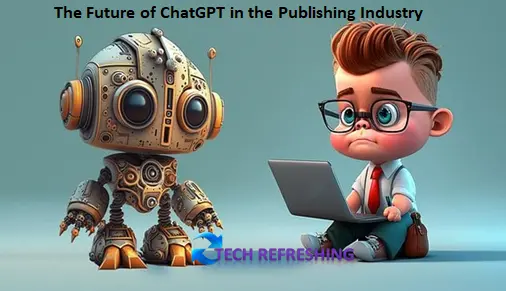
Despite the potential disadvantages, the future of ChatGPT in the publishing industry is still promising. Here are some ways that ChatGPT may enhance and supplement the writing process and contribute to the evolving publishing industry:
The potential for ChatGPT to enhance and supplement the writing process:
ChatGPT can be used as a tool to enhance and supplement the writing process. It can suggest new ideas for authors and provide inspiration for new works. It can also help authors overcome writer’s block by generating prompts or ideas that can jump-start the writing process. ChatGPT can be used as a resource to supplement the writing process by suggesting new vocabulary, providing grammar suggestions or offering other helpful tips.
The role of ChatGPT in the evolving publishing industry:
As the publishing industry continues to transform, ChatGPT is set to play a crucial role in this transformation. In light of the increasing prevalence of digital and self-publishing, ChatGPT can aid in the swift production of top-quality content. The technology can likewise assist publishers in broadening their audience by creating content in various languages and catering to diverse readerships. Additionally, ChatGPT can cut costs for publishers by diminishing the demand for human writers, editors and proofreaders.
The impact of ChatGPT on the future of authorship:
The utilization of ChatGPT in the publishing industry has the capacity to reshape our perception of authorship. As the technology is capable of generating high-quality content rapidly and effectively, human writers may become less dominant.
Nonetheless, ChatGPT can promote a more equitable publishing industry by enabling more individuals to create content and reach a broader audience. It can also result in a more diverse range of content, as ChatGPT can produce material in various languages and for different readerships.
In conclusion, ChatGPT’s prospects for growth in the publishing sector look positive. It can be utilised as a tool to improve and complete the writing process, contribute to the developing publishing sector and have an effect on the future of authorship. Notwithstanding certain possible drawbacks, it is obvious that ChatGPT has the potential to have a huge impact on the publishing sector and how we see writing and authorship.
Conclusion
ChatGPT is a potent tool with the potential to transform the publishing industry, despite having both benefits and drawbacks. Its impact on the writing process and authorship could be substantial and its use requires careful consideration of the pros and cons.
We have discussed how ChatGPT works in the publishing industry as a writing assistant, content generator, and book reviewer. Additionally, we explored the advantages of ChatGPT, such as faster content production and increased accessibility and diversity of content, as well as the potential disadvantages, including a threat to traditional publishing models and quality control concerns.
Going forward, ChatGPT has the potential to improve and complement the writing process, make a significant contribution to the continuously changing publishing industry and alter our perceptions of authorship. Although it is uncertain how ChatGPT will affect the publishing industry, it is evident that the significance of human writers may diminish. Nevertheless, ChatGPT has the potential to democratize the publishing industry and produce more varied content for diverse audiences.







